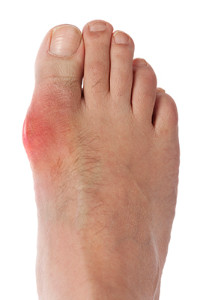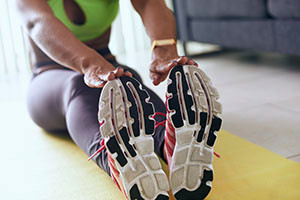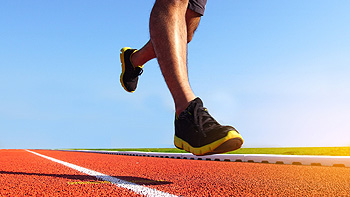
Lansdowne, PA
(610) 626-3338

Lansdowne, PA
(610) 626-3338
 Patients who are afflicted with gout are often aware of the intense pain and discomfort it may cause. It is considered to be a form of arthritis, and the pain is caused by severe swelling in the joints of the big toe. It may develop as a result of elevated uric acid levels in the bloodstream, and the types of foods that are eaten may play a significant role in developing gout. Some of these foods may include red meats and shellfish, in addition to excess alcohol and drinks that are high in fructose. Additionally, there may be specific medications that may help to cause gout, including diuretics and low-dose aspirin. Research has shown that obesity may be linked to gout attacks, and it may be helpful to implement healthy dietary changes. If you are suffering from gout, it is strongly advised that you seek the counsel of a podiatrist who can customize a treatment program that is correct for you.
Patients who are afflicted with gout are often aware of the intense pain and discomfort it may cause. It is considered to be a form of arthritis, and the pain is caused by severe swelling in the joints of the big toe. It may develop as a result of elevated uric acid levels in the bloodstream, and the types of foods that are eaten may play a significant role in developing gout. Some of these foods may include red meats and shellfish, in addition to excess alcohol and drinks that are high in fructose. Additionally, there may be specific medications that may help to cause gout, including diuretics and low-dose aspirin. Research has shown that obesity may be linked to gout attacks, and it may be helpful to implement healthy dietary changes. If you are suffering from gout, it is strongly advised that you seek the counsel of a podiatrist who can customize a treatment program that is correct for you.
Gout is a foot condition that requires certain treatment and care. If you are seeking treatment, contact Dr. George Yarnell from Pennsylvania. Our doctor will treat your foot and ankle needs.
What Is Gout?
Gout is a type of arthritis caused by a buildup of uric acid in the bloodstream. It often develops in the foot, especially the big toe area, although it can manifest in other parts of the body as well. Gout can make walking and standing very painful and is especially common in diabetics and the obese.
People typically get gout because of a poor diet. Genetic predisposition is also a factor. The children of parents who have had gout frequently have a chance of developing it themselves.
Gout can easily be identified by redness and inflammation of the big toe and the surrounding areas of the foot. Other symptoms include extreme fatigue, joint pain, and running high fevers. Sometimes corticosteroid drugs can be prescribed to treat gout, but the best way to combat this disease is to get more exercise and eat a better diet.
If you have any questions please feel free to contact our office located in Lansdowne, PA . We offer the newest diagnostic and treatment technologies for all your foot and ankle needs.
 Many runners look forward to starting their running practice and may overlook the importance of properly stretching beforehand. Running injuries may be prevented if the time is taken to implement correct stretching techniques, and this may typically take a limited amount of time. It may be beneficial to ease into running, which can be preceded by gently walking for a few minutes. Running injuries that include ankle sprains and stress fractures can be caused by overuse, and may be avoided by resting the body after running for an extended period of time. Many runners know the importance of taking time off between runs, and may strengthen the body through gym workouts. If you would like additional information about how running injuries may affect the feet, it is suggested to speak to a podiatrist who can answer any questions you may have.
Many runners look forward to starting their running practice and may overlook the importance of properly stretching beforehand. Running injuries may be prevented if the time is taken to implement correct stretching techniques, and this may typically take a limited amount of time. It may be beneficial to ease into running, which can be preceded by gently walking for a few minutes. Running injuries that include ankle sprains and stress fractures can be caused by overuse, and may be avoided by resting the body after running for an extended period of time. Many runners know the importance of taking time off between runs, and may strengthen the body through gym workouts. If you would like additional information about how running injuries may affect the feet, it is suggested to speak to a podiatrist who can answer any questions you may have.
Exercising your feet regularly with the proper foot wear is a great way to prevent injuries. If you have any concerns about your feet, contact Dr. George Yarnell of Pennsylvania. Our doctor will treat your foot and ankle needs.
How to Prevent Running Injuries
Many common running injuries are caused by overuse and overtraining. When the back of the kneecap starts wearing out and starts causing pain in your knee, this is commonly referred to as runner’s knee. Runner’s knee is a decrease in strength in your quadriceps and can occur if you’re not wearing properly fitted or supporting shoes. To prevent runner’s knee, focusing on hip strengthening is a good idea, as well as strengthening your quads to keep the kneecaps aligned.
What Are Some Causes of Running Injuries?
- One cause of a common running injury is called iliotibial band syndrome.
- Plantar fasciitis is also another common injury.
- Stress fractures can occur from overtraining, lack of calcium, or even your running style.
Best Ways to Prevent Running Injuries
- Wear footwear that fits properly and suits your running needs.
- Running shoes are the only protective gear that runners have to safeguard them from injury.
- Make a training schedule. Adding strengthening exercises as well as regular stretching can help keep you strong and limber and can lessen the possibility of injuries.
- Stretching keeps muscles limber; this will help you gain better flexibility.
If you have any questions please feel free to contact our office located in Lansdowne, PA . We offer the newest diagnostic and treatment technologies for all your foot and ankle needs.
Read more about How to Prevent Running Injuries Pregnancy causes several changes to the body, and the feet are often affected. Many pregnant women are aware of foot pain, and this may be a result of flat feet. The additional weight gain may cause the arches in the feet to flatten and roll inward, and this may place added strain on the feet and ankles. Many women notice their feet have become swollen, and this may happen because of increased blood volume. Additional conditions that may develop may include ingrown toenails, or cracked heels. When the feet are elevated and resting, mild relief may be found in possibly minimizing swelling. Research has shown that incorporating a gentle exercise program into your daily routine and drinking plenty of fresh water may play significant roles in the general health of the feet. If you are experiencing foot pain as a result of pregnancy, it is suggested to consult with a podiatrist who can properly assist you.
Pregnancy causes several changes to the body, and the feet are often affected. Many pregnant women are aware of foot pain, and this may be a result of flat feet. The additional weight gain may cause the arches in the feet to flatten and roll inward, and this may place added strain on the feet and ankles. Many women notice their feet have become swollen, and this may happen because of increased blood volume. Additional conditions that may develop may include ingrown toenails, or cracked heels. When the feet are elevated and resting, mild relief may be found in possibly minimizing swelling. Research has shown that incorporating a gentle exercise program into your daily routine and drinking plenty of fresh water may play significant roles in the general health of the feet. If you are experiencing foot pain as a result of pregnancy, it is suggested to consult with a podiatrist who can properly assist you.
Pregnant women with swollen feet can be treated with a variety of different methods that are readily available. For more information about other cures for swollen feet during pregnancy, consult with Dr. George Yarnell from Pennsylvania. Our doctor will attend to all of your foot and ankle needs.
What Foot Problems Can Arise During Pregnancy?
One problem that can occur is overpronation, which occurs when the arch of the foot flattens and tends to roll inward. This can cause pain and discomfort in your heels while you’re walking or even just standing up, trying to support your baby.
Another problem is edema, or swelling in the extremities. This often affects the feet during pregnancy but tends to occur in the later stages.
How Can I Keep My Feet Healthy During Pregnancy?
If you have any questions please feel free to contact our office located in Lansdowne, PA . We offer the newest diagnostic and treatment technologies for all your foot and ankle needs.
 People who enjoy the sport of walking or running are likely to be familiar with the differences between shoes of both sports. The types of shoes chosen will typically depend on the walking and running movements. The heel will generally come in contact with the ground first while walking, and the middle of the foot strikes the ground initially while running. Additionally, both feet are off the ground during the running phase, and this does not occur while walking. Running shoes are likely to have extra cushioning, which may be helpful in providing adequate support. Additionally, it may be beneficial to choose a running shoe that has a higher heel than walking shoes. This may be useful in providing additional support. Walkers may find that shoes with a flexible toe area may be beneficial in providing a stable walking experience. If you would like more information about how to choose running or walking shoes, please speak with a podiatrist who can properly guide you.
People who enjoy the sport of walking or running are likely to be familiar with the differences between shoes of both sports. The types of shoes chosen will typically depend on the walking and running movements. The heel will generally come in contact with the ground first while walking, and the middle of the foot strikes the ground initially while running. Additionally, both feet are off the ground during the running phase, and this does not occur while walking. Running shoes are likely to have extra cushioning, which may be helpful in providing adequate support. Additionally, it may be beneficial to choose a running shoe that has a higher heel than walking shoes. This may be useful in providing additional support. Walkers may find that shoes with a flexible toe area may be beneficial in providing a stable walking experience. If you would like more information about how to choose running or walking shoes, please speak with a podiatrist who can properly guide you.
For more information about walking shoes versus running shoes, consult with Dr. George Yarnell from Pennsylvania. Our doctor can measure your feet to determine what your needs are and help you find an appropriate pair of footwear.
Foot Health: The Differences between Walking & Running Shoes
There are great ways to stay in shape: running and walking are two great exercises to a healthy lifestyle. It is important to know that running shoes and walking shoes are not interchangeable. There is a key difference on how the feet hit the ground when someone is running or walking. This is why one should be aware that a shoe is designed differently for each activity.
You may be asking yourself what the real differences are between walking and running shoes and the answers may shock you.
Differences
Walking doesn’t involve as much stress or impact on the feet as running does. However, this doesn’t mean that you should be any less prepared. When you’re walking, you land on your heels and have your foot roll forward. This rolling motion requires additional support to the feet.
Flexibility – Walking shoes are designed to have soft, flexible soles. This allows the walker to push off easily with each step.
If you have any questions, please feel free to contact our office located in Lansdowne, PA . We offer the newest diagnostic and treatment technologies for all your foot care needs.